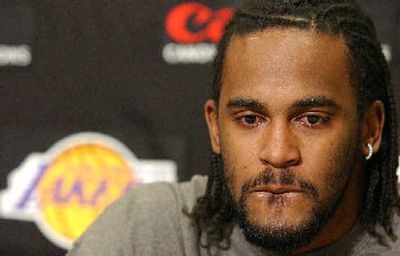Turiaf trying to maintain positive outlook

He was defiant one second and tearful the next, but Ronny Turiaf tried mightily Friday to put the sunniest spin on the devastating revelation that his basketball career could be over.
For the moment, he’s simply resisting that notion.
“I definitely will be back on the court – that’s my way of thinking right now,” he insisted.
Newly graduated from Gonzaga, Turiaf had signed a contract last week with the Los Angeles Lakers after being selected in the second round of the National Basketball Association draft and making several strong appearances with the club’s entry in the Southern California Summer Pro League.
But the requisite physical examination to validate that contract alerted doctors to an enlarged aortic root, and now the 22-year-old faces a daunting surgery and an uncertain future.
And despite his optimistic outlook, Turiaf is not blind to the realities of his condition.
“I’m scared of dying, I’m sorry to say,” he said. “This is a big thing. I heard that they’re going to cut my sternum up and do all kinds of stuff. This is scary. But I have faith.
“I’ve never seen so many great doctors. We talked to the guy who created this surgery. So I’m scared, but I just want to open my eyes after surgery – that’s what it is. After that, everything will go from there.”
Turiaf appeared at a press conference at the Lakers’ El Segundo training facility a day after the club announced the findings and recommendations of four different doctors who conducted examinations.
According to Lakers spokesman John Black, doctors in Paris, where Turiaf played in high school, and at the NBA’s pre-draft camp in Chicago earlier this summer detected a heart abnormality but determined it not to be life-threatening, thus clearing Turiaf to play.
But Lakers doctors disputed the findings after further tests last week. Turiaf’s aorta was found to be 5.6 centimeters in diameter, or about 50 percent larger than normal, increasing the possibility of a rupture. According to Black, one doctor said there was a 75 percent chance that Turiaf would have experienced a potentially fatal episode within a three- to four-year period, just from everyday activity.
That diagnosis voided the agreed-upon contract, which was to be for two years – the first guaranteed – and worth about $1 million. But the Lakers are offering to pay for Turiaf’s medical expenses that figure to exceed $100,000, although the NBA apparently must approve such an arrangement.
Turiaf dismissed questions about that, saying that “it’s not about a contract.
“I know the Lakers will do their best to take care of me,” he said, “and put me in the right position to succeed and be healthy again.”
The surgery is expected to occur within the next six weeks. There is no definitive prognosis as to whether Turiaf will ever be able to return to the sport.
“If I do have surgery, I going to try everything I can to beat it,” Turiaf said. “I know this is a hard surgery and I’m still hoping for some reason that I won’t have to have surgery. I don’t know why, but I’m still hoping.”
Turiaf’s emotions swung from gratitude to regret to anger during his brief appearance, though he continually smiled and tried to look at the situation with hope.
“First of all, I’d like to thank the Lakers organization for the support, especially (general manager) Mitch Kupchak and John Black,” he said. “I’d like to thank the L.A. fans. In the short time I was here, they gave me the love and made me feel good about being part of the organization. And anybody else who called me and expressed their feelings about how tough it is, I want to thank them for being there for me.”
Turiaf also singled out Lakers star Kobe Bryant, who called with a supportive message.
His regrets centered around his family, and that’s when Turiaf grew angry and tearful, stopping to wipe his eyes with the collar of his T-shirt.
“I’ve been by myself since I was 14 years old, trying to make a living for my family,” said Turiaf, who left his native Martinique to first attend high school in Paris and then later enroll at Gonzaga, where he was a three-time all-league player and West Coast Conference player of the year as a senior this past season.
“I’ve been trying to provide financial support for them and today is just another setback, you know – another hurdle that I have to jump over.
“Everything happens for a reason. I’ve been fortunate to play basketball for eight years. I had great memories in college. It’s tough, but I’m going to get through it and I’m not going to let my family down. You’re going to have to freakin’ kill me. I’m going to get through it.”
And yet in the next breath, Turiaf acknowledged the silver lining of the condition being diagnosed in time – and that basketball is not his only option in life.
“I have faith (in being able to come back),” he said, “but if not, I’m smart and I have a degree in sports management and communications, so I’m going to make some money no matter what. I can guarantee you that.”